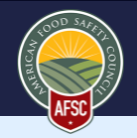Food Safety involves preparing, handling and storing food using best practices in order to reduce the chances that individuals or groups will become sick due to a variety of potential food-borne illnesses. Below is a glossary of common food safety related terms and topics.

Food Safety involves preparing, handling and storing food using best practices in order to reduce the chances that individuals or groups will become sick due to a variety of potential food-borne illnesses. Below is a glossary of common food safety related terms and topics.
Bacteria
A living single-celled microscopic organism. They can be transported through water, people, food, plants, animals, and insects. Bacteria likes warm and dark places, thriving in room temperature food, intestines, mouth, nose, throat, and scars/scabs.
Biological food hazard
Conditions or contaminants present in food that can cause illness or injury. This includes toxins in: bacteria, viruses, yeast, mold, and parasites. Not excluding natural toxins in things such as plants and fish.
Contamination
Harmful chemicals and microorganisms present in food that can cause illness.
Cross-contamination
The transfer of harmful germs and substances from one surface to another. This can be by: hands, contact-to-contact with unclean surfaces, unclean utensils touching food etc. This can also be a result of raw food coming in contact with clean surfaces or already prepared, safe food.
Foodborne illness
Any illness resulting from spoilage of any contaminated food, bacterial pathogens, viruses, parasites, and chemical or natural toxins that are present in consumed food or drink.
Food contact surface
All forms of utensils, containers, boards, or counters that may come in contact with food. Following safety guidelines, all surfaces that contact food should be properly cleaned to ensure health safety.
Fungi
A group of microorganisms including molds and yeast.
Incidence
Number of new cases in foodborne illness or specific illness (i.e. Salmonella) in a given population in a specific amount of time.
Microorganism
A microscopic organism that can result in disease or illness. (i.e. bacterium, fungus, viruses)
Outbreak
An incident where two or more people experience the same illness from the same food.
Parasite
A microorganism that requires a host for survival, strength, and spread.
Pathogen
A microscopic organism leading to infection, illness, and disease.
Spore
A thick, protective layer of a bacteria that protects its cells. They serve in aiding the bacteria to live through conditions like cooking, sanitizing, and freezing.
Toxins
Microorganisms produce toxins which are harmful when consumed. Fish and plants can also carry toxins.
Virus
An infecting agent usually consisting of nucleic acid. It is too small to be seen through light microscopy, and can only reproduce inside of a living host.
The American Food Safety Council (AFSC) is a non-profit organization focused on bringing awareness and assistance to individuals and companies regarding food safety knowledge and routines.
Over 48 million Americans each year contract some form of food-borned illness. It is important to stay diligent and aware of the consequences of inadequate food safety measures.
© 2025 coursetakers.com All Rights Reserved. Terms and Conditions of use | Privacy Policy